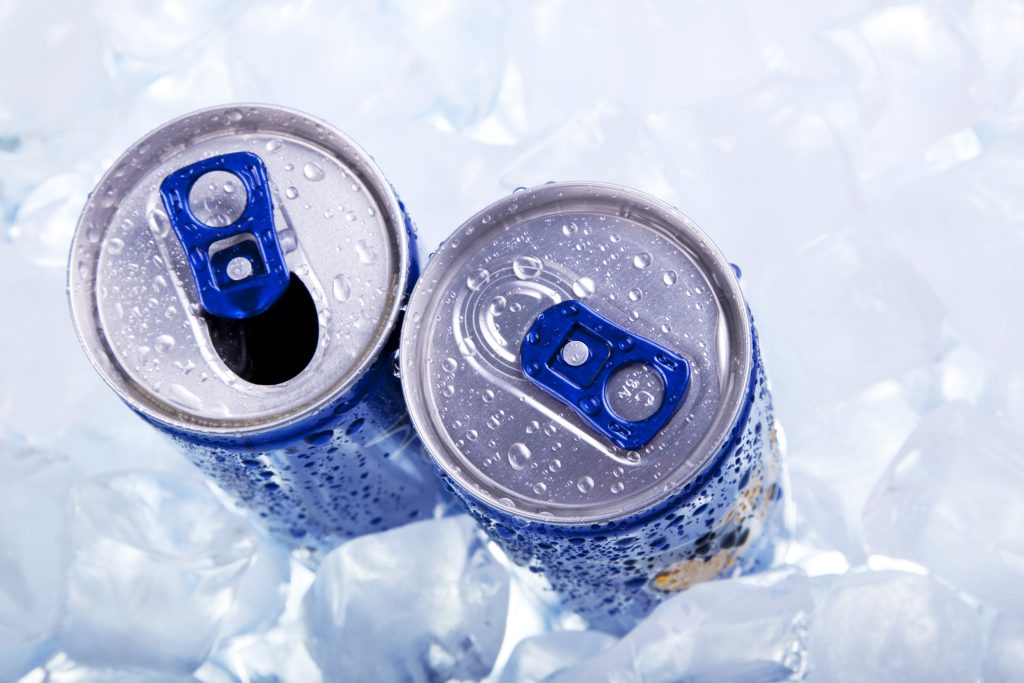
Energy drinks, offered as an alternative to caffeinated beverages like coffee and tea, are formulated to make us feel more alert and more energized. The idea of an ultra-caffeinated drink is appealing to those who work long hours, play sports, or are just in need of some extra energy to get through the day. However, energy drinks and the ingredients they contain have been linked to a number of adverse health effects (Alsunni,2015). Energy drinks contain high amounts of caffeine and sugar, the consumption of which can have negative consequences for our cardiovascular and even mental health, especially in adolescents (The Nutrition Source, 2020).
If you’re training to become a nutritionist, here’s why energy drinks may be more harmful to our health than one might think.
Students in Nutritionist School Should Know That Energy Drinks Contain High Levels of Sugar and Caffeine
While energy drinks have often been marketed as “healthy,” a closer look at the list of ingredients in many of these products tells a different story. While a cup of coffee contains about 100 mg of caffeine, energy drinks typically contain at least 200 mg of caffeine, and that’s on top of around 41 grams of sugar (The Nutrition Source, 2020). Caffeine, especially in high doses, has been known to cause dehydration, anxiety, and other problems, depending on an individual’s sensitivity to the substance (Mayo Clinic, 2020).

Additionally, the high level of sugar found in most energy drinks is connected to an increased risk of weight gain, the development of type 2 diabetes, gout and other adverse health effects (The Nutrition Source, 2021). While the effects of excessive amounts of either sugar or caffeine alone can be consequential, those in nutritionist college should be aware of the negative potential impact of consuming energy drinks, which contain high amounts of both ingredients.
Energy Drinks Can Negatively Affect the Cardiovascular System and Brain
Due to their high caffeine and sugar content, energy drinks have been linked in research to health issues within both the cardiovascular system and the brain (Alsunni,2015). A recent study found that energy drinks raised participants’ blood pressures and altered the electrical activity of their hearts (Shah et al., 2019). For individuals with heart conditions, consuming energy drinks raises the risk of developing an irregular heartbeat or experiencing an arrhythmia (Howard, 2019). Additionally, energy drink consumption has been found to increase the thickness of blood (Worthley et. al., 2019).

If you’re training towards your nutrition diploma, it’s also important to know that energy drink consumption can negatively affect our brains, primarily due to the high amount of caffeine they contain (Alsunni,2015). Caffeine intoxication can occur after consuming more than 200 mg of caffeine, the amount that most energy drinks contain, with symptoms including anxiety, insomnia, and more (Alsunni, 2015). Additionally, caffeine intake can create high levels of cortisol, causing enhanced stress levels (Alsunni,2015).
Energy Drinks Have a Heightened Effect on Adolescents
While energy drinks can be dangerous for adult consumption, they are even more detrimental to adolescents (The Nutrition Source, 2020). The energy drink industry has grown larger over the past 20 years (Frontiers, 2017), and much of the advertising conducted by manufacturers is targeting youth populations rather than the general public (The Nutrition Source, 2020).
These marketing techniques are problematic due to the fact that adolescents are more susceptible to the negative effects of caffeine than adults (Howard, 2019). It has been shown that for young people, elevated blood pressure can be the result of a caffeine intake of more than 100 mg a day, which is about half as much caffeine as most energy drinks on the market contain (Howard, 2019). Thus, due to their high sugar and caffeine content, it’s safe to say that today’s children would be better off opting for water or a non-caffeinated, low sugar sports drink rather than an energy drink.
Why Knowing About this Research is Relevant to Those Training to be Nutritionists
As you train to become a professional in the field of nutrition, you will be responsible for advising clients of all ages on ways to improve their health through nutritional strategies. With this in mind, it’s important to have a firm grasp on the existing research on energy drinks, in order to pass your findings onto clients and make the appropriate recommendations. Your clients will trust you to help them make beneficial nutritional changes, and by informing them of the potential dangers of consuming energy drinks, you have the power to make a difference in the lives of your clients.
Ready to attend nutritionist school?
Contact Rhodes Wellness College to get started today.
Works Cited:
- Alsunni A. A. (2015). Energy Drink Consumption: Beneficial and Adverse Health Effects. International journal of health sciences, 9(4), 468–474. Retrieved March 22, 2021 from https://www.ncbi.nlm.nih.gov/pmc/articles/PMC4682602/
- Frontiers. (2017, November 15). Serious health risks associated with energy drinks: To curb this growing public health issue, policy makers should regulate sales and marketing towards children and adolescents and set upper limits on caffeine. ScienceDaily. Retrieved March 22, 2021 from www.sciencedaily.com/releases/2017/11/171115124519.htm
- Harvard T.H. Chan School of Public Health. (2020, July 30). Energy drinks. The Nutrition Source. Retrieved March 22, 2021, from https://www.hsph.harvard.edu/nutritionsource/energy-drinks/
- Harvard T.H. Chan School of Public Health. (2021). Sugary drinks. The Nutrition Source. Retrieved March 22, 2021 from https://www.hsph.harvard.edu/nutritionsource/healthy-drinks/sugary-drinks/
- Howard, Jacqueline. (2019, May 29). Energy drinks may have unintended health risks. Retrieved March 22, 2021, from https://www.cnn.com/2019/05/29/health/energy-drinks-health-concerns-study-explainer/index.html
- Mayo Clinic. (2020, March 06). Caffeine: How much is too much? Retrieved March 22, 2021, from https://www.mayoclinic.org/healthy-lifestyle/nutrition-and-healthy-eating/in-depth/caffeine/art-20045678
- Shah, S. A., Szeto, A. H., Farewell, R., Shek, A., Fan, D., Quach, K. N., . . . Kaul, S. (2019). Impact of high Volume energy drink consumption on Electrocardiographic and blood Pressure parameters: A randomized trial. Journal of the American Heart Association, 8(11). doi:10.1161/jaha.118.011318
- Worthley, M. I., Prabhu, A., De Sciscio, P., Schultz, C., Sanders, P., & Willoughby, S. R. (2010). Detrimental effects of energy drink consumption on platelet and endothelial function. The American journal of medicine, 123(2), 184–187. https://doi.org/10.1016/j.amjmed.2009.09.013









